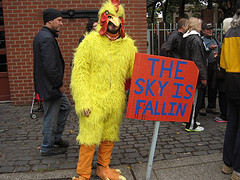Copyright 2007-25 Digital Media Law Project and respective authors. Except where otherwise noted,
content on this site is licensed under a Creative Commons Attribution-Noncommercial-ShareAlike 3.0 License: Details.
Use of this site is pursuant to our Terms of Use and Privacy Notice.
content on this site is licensed under a Creative Commons Attribution-Noncommercial-ShareAlike 3.0 License: Details.
Use of this site is pursuant to our Terms of Use and Privacy Notice.



 Perhaps it’s the nightly lobster tails and
Perhaps it’s the nightly lobster tails and  The Arkansas Supreme Court has reversed
a murder conviction – and death sentence – in a case where one juror
tweeted during trial, while another fell asleep. Both these problems,
the court said, constituted juror misconduct requiring reversal and a
new trial.
The Arkansas Supreme Court has reversed
a murder conviction – and death sentence – in a case where one juror
tweeted during trial, while another fell asleep. Both these problems,
the court said, constituted juror misconduct requiring reversal and a
new trial.  We are pleased to announce that the Online Media Legal Network, the Citizen Media Law Project's legal referral service, is now two years old!
We are pleased to announce that the Online Media Legal Network, the Citizen Media Law Project's legal referral service, is now two years old!
 There's been a lot of buzz online (and now
There's been a lot of buzz online (and now Unlike traditional newsroom journalists, “citizen journalists” have
no formal way to ensure that everyone maintains similar quality
standards. Which does not mean that quality standards are necessarily
(or consistently) maintained at traditional newsrooms, but rather that a
traditional hierarchical editorial structure imposes at least
theoretical guidelines.
Unlike traditional newsroom journalists, “citizen journalists” have
no formal way to ensure that everyone maintains similar quality
standards. Which does not mean that quality standards are necessarily
(or consistently) maintained at traditional newsrooms, but rather that a
traditional hierarchical editorial structure imposes at least
theoretical guidelines.
 Is it possible that the tent is the new burning flag?
Is it possible that the tent is the new burning flag?
 In response to local Occupy protests, Tennessee Safety Commissioner Bill Gibbons said in October that “we don’t have the resources to go out and, in effect, babysit protesters.” But as the
In response to local Occupy protests, Tennessee Safety Commissioner Bill Gibbons said in October that “we don’t have the resources to go out and, in effect, babysit protesters.” But as the  The Blog of the Legal Times reports
The Blog of the Legal Times reports When web developer
When web developer 
 Give the Obama Administration credit for trying.
Give the Obama Administration credit for trying.
 A French court last month stomped on what we in the United States consider a “basic, vital, and well-established liberty” – the right to record and publish the public activity of police.
A French court last month stomped on what we in the United States consider a “basic, vital, and well-established liberty” – the right to record and publish the public activity of police.
 The Anti-Counterfeiting Trade Agreement (ACTA) is slowly inching its way towards implementation, but obstacles still remain.
The Anti-Counterfeiting Trade Agreement (ACTA) is slowly inching its way towards implementation, but obstacles still remain. Back in March, I
Back in March, I 